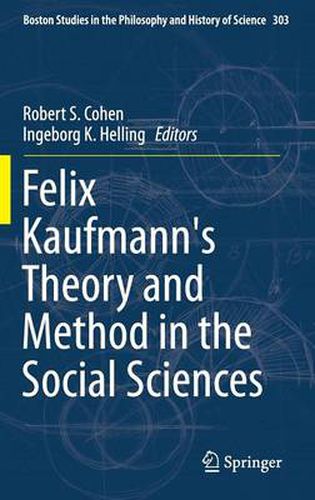Readings Newsletter
Become a Readings Member to make your shopping experience even easier.
Sign in or sign up for free!
You’re not far away from qualifying for FREE standard shipping within Australia
You’ve qualified for FREE standard shipping within Australia
The cart is loading…






This title is printed to order. This book may have been self-published. If so, we cannot guarantee the quality of the content. In the main most books will have gone through the editing process however some may not. We therefore suggest that you be aware of this before ordering this book. If in doubt check either the author or publisher’s details as we are unable to accept any returns unless they are faulty. Please contact us if you have any questions.
This volume contains the English translation of Felix Kaufmann’s (1895-1945) main work Methodenlehre der Sozialwissenschaften (1936). In this book, Kaufmann develops a general theory of knowledge of the social sciences in his role as a cross-border commuter between Husserl’s phenomenology, Kelsen’s pure theory of law and the logical positivism of the Vienna Circle. This multilayered inquiry connects the value-oriented reflections of a general philosophy of science with the specificity of the methods and theories of the social sciences, as opposed to abstract natural science and psychology. The core focus of the study is the attempt to elucidate how and under what conditions scientific knowledge about social facts, empirically justified and theoretically embedded, can be obtained. The empirical basis of knowledge within the social sciences forms a phenomenological concept of experience. According to Kaufmann, this concept of experience exhibits a complex structure. Within the meaning-interpretation of human action as the core of knowledge in the social sciences, this structure reaches out across the isolated act of verification toward the synthesis of external and internal experiences. The book opens with a detailed and useful introduction by Ingeborg K. Helling, which introduces the historical and theoretical background of Kaufmann’s study and specifically illuminates his relation to Alfred Schutz and John Dewey. Finally, it contains interviews with and letters to members of his family, colleagues and students.
$9.00 standard shipping within Australia
FREE standard shipping within Australia for orders over $100.00
Express & International shipping calculated at checkout
Stock availability can be subject to change without notice. We recommend calling the shop or contacting our online team to check availability of low stock items. Please see our Shopping Online page for more details.
This title is printed to order. This book may have been self-published. If so, we cannot guarantee the quality of the content. In the main most books will have gone through the editing process however some may not. We therefore suggest that you be aware of this before ordering this book. If in doubt check either the author or publisher’s details as we are unable to accept any returns unless they are faulty. Please contact us if you have any questions.
This volume contains the English translation of Felix Kaufmann’s (1895-1945) main work Methodenlehre der Sozialwissenschaften (1936). In this book, Kaufmann develops a general theory of knowledge of the social sciences in his role as a cross-border commuter between Husserl’s phenomenology, Kelsen’s pure theory of law and the logical positivism of the Vienna Circle. This multilayered inquiry connects the value-oriented reflections of a general philosophy of science with the specificity of the methods and theories of the social sciences, as opposed to abstract natural science and psychology. The core focus of the study is the attempt to elucidate how and under what conditions scientific knowledge about social facts, empirically justified and theoretically embedded, can be obtained. The empirical basis of knowledge within the social sciences forms a phenomenological concept of experience. According to Kaufmann, this concept of experience exhibits a complex structure. Within the meaning-interpretation of human action as the core of knowledge in the social sciences, this structure reaches out across the isolated act of verification toward the synthesis of external and internal experiences. The book opens with a detailed and useful introduction by Ingeborg K. Helling, which introduces the historical and theoretical background of Kaufmann’s study and specifically illuminates his relation to Alfred Schutz and John Dewey. Finally, it contains interviews with and letters to members of his family, colleagues and students.